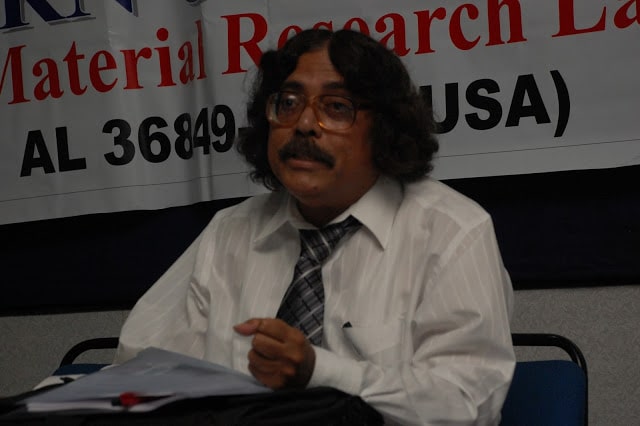Nonconjugated Conductive Polymers Protect Against Radioactive Iodine: Professor Mrinal Thakur

New Delhi, July 2, 2023: Nonconjugated Conductive Polymers discovered by Professor Mrinal Thakur can effectively absorb nuclear radiation including radioactive iodine emitted from nuclear reactors particularly in the event of radiation leakages.
As the Russia-Ukraine war continues to rage, the importance of protection against nuclear radiation including radioiodine and the impact of Nonconjugated Conductive Polymers for shielding applications have become more profound.
Professor Thakur, the Director of Photonic Materials Research Laboratory at Auburn University (USA), made many scientific breakthroughs in the areas of Nonconjugated Conductive Polymers, Nonlinear Optics and Nano-optics.
His successful researches can further be promoted and used for the mass anti-nuclear radiation security for the people in Europe and all other parts of the world if research funding is done by the USA and other countries.
But it is not being done despite repeated appeals. It should be emphasized here that Professor Thakur’s research funding was abruptly stopped in 2003 as soon as he brought to light the incorrectness and inequity regarding the 2000 Nobel Prize in Chemistry. Strange reaction by the US Government!
Since iodine radiation takes place quite often in different parts of the world due to its leakage from reactors and other nuclear facilities, the global leaders should come forward to promote the applications of Nonconjugated Conductive Polymers for the greater welfare of human beings.
Though the discovery of Nonconjugated Conductive Polymers that can absorb iodine by Professor Thakur entitled him a Nobel Prize in Chemistry, the Royal Swedish Academy of Sciences (RSAS) deprived him of this honor for 22 long years.
The RSAS only recognized the discovery of “Conjugated” Conductive Polymers but denied recognition to the “Nonconjugated” Conductive Polymers which is a violation of high academic norms.
If the USA and all other European countries, Professor Thakur says, resort to mass deployment of such “Nonconjugated” Conductive Polymers filament as shields, thousands of human lives can be protected against iodine toxicity.
Radioactive iodine poisoning can cause different ailments including thyroid cancer. No wonder, there is a huge demand for the potassium-iodide pills throughout the European Union (EU) for fear of nuclear radiation due to the ongoing Ukraine-Russia war.
This concern is well justified as the radioactive iodine can be lethal. It poses danger to human lives, all animals, water resources and overall ecology as it remains in a state of vapor at ordinary temperature and can travel long distances over a very short time.
This danger can be minimized if Professor Thakur’s discovery is put in use for mass welfare. The world leaders can suggest application of the polymer shields on a mass scale around the nuclear reactors (standard and modular) and the nuclear waste facilities which store spent nuclear fuel rods.
Among radioactive species emitted by nuclear reactors, radioactive iodine is particularly dangerous since it remains as a vapor at ordinary temperature and can travel long distances by air-currents.
Radioactive iodine emitted from Fukushima plants, Japan, crossed the Pacific Ocean to arrive at California, USA and has been reported to have caused health hazards! Radioactive iodine is readily absorbed by human body and causes thyroid cancer and other serious ailments.
In hospitals and clinics, the doctors, nurses and attendees are often worried of being exposed to radioactive iodine during and after radio-iodine therapy of patients having thyroid cancer and hyperthyroidism.
Patients emit radiation for a number of days after taking a capsule containing radioiodine. Use of apparels made of the nonconjugated conductive polymers reduces the potential exposure to radioiodine and lessens the anxiety. Thyroid cancer cases in USA have tripled in the last three decades (NBC news, August 2016) probably because of the large number of nuclear reactors (about 100 of those) in USA.
All the countries having nuclear reactors should demand for global funds to meet the cost of safeguarding their facilities and press upon the global leaders to come forward to save the earth against nuclear radiation fallouts.
The United Nations can play a very important role in persuading the world leaders to act together to accomplish this global application for Protection of Mankind and the Environment while continuing to enhance and employ the abundant nuclear energy sources.





